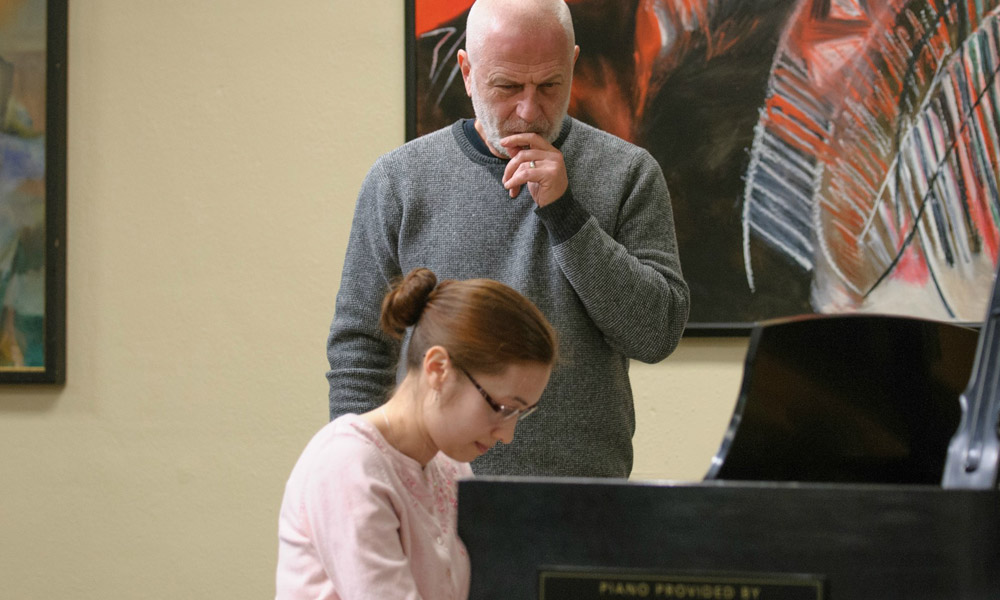Page 117 • (1,210 results in 0.043 seconds)
-

work with a limited knowledge of schools,” she said. The master’s program at PLU “got me to buy into the reason why I’m doing this. It taught me the skills to be a great educator, and a deep-thinking, reflective educator.” Cook believes education is a pathway out of poverty for her students. “It’s so much more than learning algebra or language arts,” she said. “Education is building humans.” Evelyn Cook Principal PrepIntensive PLU program prepares future principals. Alternative Routes to
-
skill set. “I went into my master’s work with a limited knowledge of schools,” she said. The master’s program at PLU “got me to buy into the reason why I’m doing this. It taught me the skills to be a great educator, and a deep-thinking, reflective educator.” Cook believes education is a pathway out of poverty for her students. “It’s so much more than learning algebra or language arts,” she said. “Education is building humans.” Evelyn Cook Principal PrepIntensive PLU program prepares future
-

at professional meetings, such as the Western Psychological Association, Association for Psychological Sciences, Society of Research in Child Development, and Cognitive Science Society. Did you know? PLU Psychology students often work in research labs with faculty and assist in authoring manuscripts for publication. For example, several PLU graduates are co-authors on a study that is currently in press in the peer-reviewed journal "Language and Cognition." Did you know? Want to study away
-
. Mossi cavalry from northern Ghana swept onto the Mossi plateau of central Burkina Faso in the 15th century. Farming peoples, which then included the Dogon, Lela, Winiama, and Nuna, populated this area. Those who did not flee intermarried with the Mossi, resulting in the diversity of sculpture and mask designs found on the plateau today. The contemporary Mossi are primarily famers, tending to crops of millet, sorghum, maize and groundnuts. In the north, some Mossi raise livestock. The Mossi language
-
designations, and the ethical/political effects of such questions. (4) PHIL 229 : Human Rights - VW This course examines historical development of philosophical notions associated with "rights-based" language in domestic and international political life, and how these concepts are essential to understand the emergency and dominant discourse of human rights post 1948. (4) PHIL 231 : Ancient Philosophy - VW The development of philosophical thought and methods from the Pre-Socratic period to the end of the
-

play piano much because I was too busy with other classes. It was also at this time when … I decided to switch my religion major to a music major—it seemed like the perfect excuse to practice piano more! How do you hope to use both majors in China as you pursue your master’s? I’m applying to music schools in China so I can be immersed in the Chinese language and still continue my studies in piano. I am interested in Chinese interpretation work, and of course I want to continue teaching and playing
-

able to play piano much because I was too busy with other classes. It was also at this time when … I decided to switch my religion major to a music major—it seemed like the perfect excuse to practice piano more! How do you hope to use both majors in China as you pursue your master’s? I’m applying to music schools in China so I can be immersed in the Chinese language and still continue my studies in piano. I am interested in Chinese interpretation work, and of course I want to continue teaching and
-

institutions in the U.S. Navigating college can be difficult for any student, but it’s particularly challenging when you or your family might not understand the ins and outs of higher education. For those learning to navigate the language and culture of college, here are five things every current and incoming first-in-the-family student should know. And Gurjot Kang ’21 — a current first-generation student living in the “First in the Family” community in Stuen Hall — shares her perspective on all five. 1
-

Kris Plaehn, the center’s Executive Director, that was an intentional part of the Center’s design process. “It’s flexible space — we want students to see where the support (systems) are,” Plaehn said. “(We wanted) to build open space that students can configure however they want to. You can make an appointment with a research librarian, the writing center, a language tutor, any sort of academic assistance tutor, an academic advisor or reserve one of these rooms … all in the same place.” The Center
-

really was no extra money.” Arriving at PLU in 1975 from her new home in Oregon, Kullberg was drawn (pun intended) not to art but instead to classes in Japanese, thanks to her love for the people, language and culture of Japan. But because the professor who taught Japanese at PLU had retired, she pursued an Education degree. Now a resident of Federal Way, Wash., Kullberg lived in Stuen Residence Hall all four years at PLU. The art building was visible from her window, so she watched art students go
Do you have any feedback for us? If so, feel free to use our Feedback Form.


